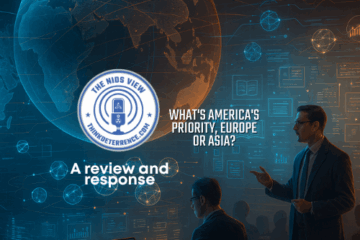There are at least five compelling reasons for supporting continued American efforts to prevent the spread of nuclear arms. This is despite the aggressive nuclear buildup of Russia and China.
First, there is concern that rogue states and terrorist groups with nuclear weapons would seek to bring on the very Armageddon deterrence is designed to prevent. Ensuring this concern is never materialized is a clear objective of the United States.
Second, adding new countries to the nuclear club increases the risks of accidents and theft as safely deploying and testing nuclear weapons is not something learned at a few evening seminars. It took the United States several decades to perfect nuclear safety measures.
Third, further proliferation by any signatories would violate the 1970 Nuclear Non-Proliferation Treaty (NPT) and might begin its unravelling. Although the NPT does allow a ratifying state to withdraw on three months’ notice for reasons of supreme national interests, it does not make legal any prior acts in violation of the treaty or mitigate the consequences of withdrawal.
Fourth, adding to the nuclear club would dangerously complicate maintaining stability during an international crisis in that any use of nuclear force might very well trigger multiple conflicts that could easily get out of hand. In short, additional nuclear states could create greater uncertainty.
Fifth, with added nuclear states in the world, there is a potential for greater risks of horizontal and vertical escalation in the event nuclear deterrence fails. Such risks are hard to predict because states may act in unexpected ways to overcome a threat.
Although the United States is a reliable nonproliferation partner, there are growing doubts about the reliability of the United States’ extended nuclear deterrent. America’s allies are increasingly contemplating whether to pursue their own nuclear arsenals. This includes the creation of an independent European nuclear capability, as recently proposed by French President Emmanuel Macron. A key ingredient to the increasing doubt is the growing nuclear arsenals of Russia and China, both designed to coerce the United States into standing down in a crisis or conflict.
Complicating matters is the fact that many allies still seek enhanced trade and investment ties with both Russia and China, which leads them to take different positions on issues like the war in Ukraine and Taiwan’s sovereignty. These challenges should not lead the United States to give up its long-established opposition to the spread of nuclear arms. North Atlantic Treaty Organization (NATO) and Asian allies are, despite economic interests, grappling with the consequences of growing nuclear arsenals and connected nuclear threats from Xi Jinping and Vladimir Putin.
Germany, Japan, and South Korea are beneficiaries of American extended deterrence, but they are also nations with domestic publics increasingly discussing the pursuit of independent nuclear arsenals. The thinking goes: independent arsenals in these states would serve as checks on Russian or Chinese coercion and aggression. Arguing in favor of such proliferation, analysts suggest that if Ukraine kept those Russian nuclear weapons on its territory after the Soviet Union’s collapse, Russia would not have invaded. This argument has many flaws, but the overriding point is valid.
Unlike the United States, which never had expansionist desires in Afghanistan or Iraq, Russia and China have territorial ambitions in the states that fear them the most. This makes the security environment more troubling for our allies. Having nuclear weapons to defend one’s territorial integrity is one thing; possessing nuclear weapons as a security shield behind which one can undertake military adventures is another.
Some 174 nations do not have nuclear weapons and are not repeat victims of invasion by nuclear-armed states or their non-nuclear neighbors. Belarus, Kazakhstan, Ukraine, and South Africa all voluntarily gave up their nuclear weapons. South Africa did not want a communist-oriented African National Congress to have nuclear weapons should it come into power. The three Soviet Republics were guaranteed independence in return for giving up the Soviet nuclear forces they inherited. This was all to prevent an additional three nuclear powers from emerging on Russia’s borders.
Despite nuclear disarmament efforts, national leaders around the world clearly understand that nuclear weapons are effective at deterring adversary attack and invasion. The United States’ nuclear umbrella has, for six decades, protected European and Asian allies from existential harm. The confidence of past decades is now wavering and may lead to the very nuclear proliferation the United States has spent seven decades attempting to prevent. Should it occur, it may not only be friends who proliferate but additional foes.
In fact, the weakness of American extended deterrence may set off a proliferation cascade that dramatically increases the probability of nuclear use. When Donald Rumsfeld once said, “Weakness is provocative,” he was right. A strong extended deterrent is the best way to prevent nuclear proliferation.
Peter Huessy is a Senior Fellow at the National Institute for Deterrence Studies. Joe Buff is an experienced actuary with more than three decades in the analysis of risk. Views expressed in this article are the author’s own






